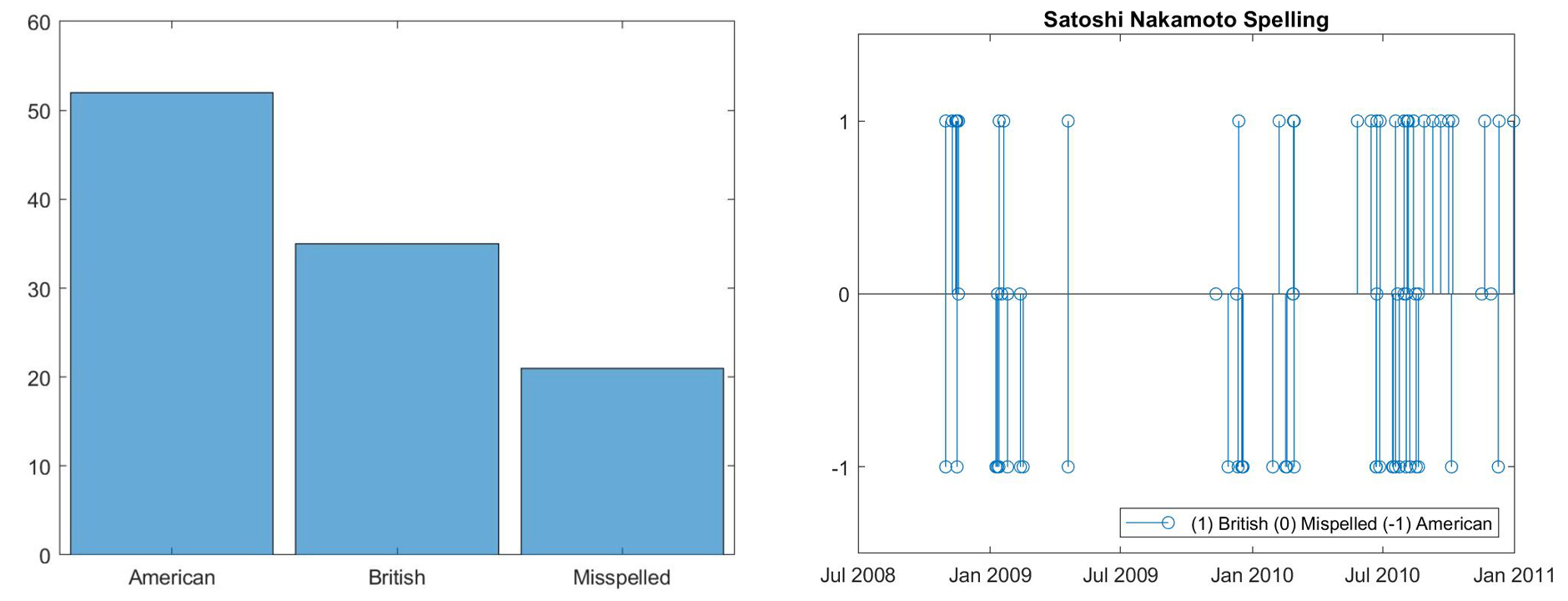On December 31, 2020, a new report was published that studies Satoshi Nakamoto’s writing style, the creator’s use of expressions, and spelling. The new examination shows Satoshi’s spelling and American and British wording indicates it was very inconsistent and littered with misspellings as well. The research suggests the inconsistencies might have been done purposefully and were possibly part of the inventor’s operations security.
A Closer Look at Satoshi Nakamoto’s Spelling and the Inventor’s American and British English Writing Techniques
One of the most intriguing stories in the cryptocurrency space is the mysterious Satoshi Nakamoto, the man, woman, or group that created bitcoin. Over the last 12 years, people have dedicated lots of time toward searching for the Bitcoin inventor’s location, Satoshi’s writing patterns, and the many messages that Satoshi wrote before leaving the community. On the eve of 2021, a study published on the website ungeared.com called “The Strange Story of Satoshi Nakamoto’s Spelling Choices: Part 1,” a study that looks into the Satoshi Nakamoto mystery.
The researchers at ungeared.com scrutinized Satoshi Nakamoto’s writing style, misspellings, and the use of American and British-English expressions found throughout the creator’s many messages. Ungeared.com’s study also discusses how people often talk about Satoshi’s use of British-English and how there’s been a number of stylometry investigations that produced little results. The researcher’s examination also mentions the series of controversial Satoshi videos published by the popular Youtuber “Barely Sociable.”
“We decided to subject Satoshi’s known writings (emails, posts, and the Bitcoin white paper) to a more rigorous statistical analysis,” explained the ungeared.com researchers. “In the first part of this study, we examine his spelling patterns.” The study’s author adds:
Satoshi’s spelling was inconsistent in his choices of American vs. British-English.
The report stresses that the focus on spelling is a “more objective mathematical approach and is also less time-consuming.” So the researchers combed through all of Satoshi’s words and identified a number of interesting instances. “We managed to identify 108 such instances. The breakdown of these 108 occurrences is as follows: American – 52, British – 35 and Misspelled – 21,” the report notes. Ungeared.com’s report continues:
There were also several instances when Satoshi used alternate spelling norms on the same day and sometimes even within the same post or email.
The report found that from the very start Satoshi’s spelling was “inconsistent.” For example, the author notes how the Bitcoin inventor’s white paper has the British spelling “favour.” However, at the end of the paper Satoshi used the American-English term “characterized,” as opposed to writing the British spelling “characterised.”
“There is no apparent pattern to Satoshi’s spelling choices,” the author writes. “Moreover, at times, Satoshi would choose different spelling norms for the same word (or words belonging to the same stem group).”
Were Satoshi’s Inconsistencies Intentional? Or Was Nakamoto a Group of Multiple British and American Team Members?
The study summarized all the instances when Satoshi alternated between differing spelling techniques and found six other days with these instances in addition to the white paper. Ungeared.com’s study highlights the instance when Satoshi chose to use the word “optimization” and the same day he wrote “optimisation.” Additionally, the paper discusses spelling patterns consisting of both American and British during specific days of the week.
“While Mondays, Wednesdays, and Saturdays are dominated by American spelling, Tuesdays, Fridays, and Sundays are split more or less evenly between the two, and finally, and on Thursdays, British English takes hold,” the author states. “Although it is not clear what conclusions can be drawn from this as this could be random too. We can also clearly see that Mondays were by far the busiest days of the week for Satoshi, followed by lazy Tuesdays.”
In addition, the report looks at whether or not the writing could be Canadian and it scrutinizes Satoshi’s use of American terminology as well. The study concludes that Satoshi did not habitually use a spell-checker and the inconsistencies of the inventor’s writings could’ve been done purposefully.
“It is possible that this was part of the plan all along – to throw us off his trail with irregular spelling,” Ungeared.com’s study concludes. “Another is that the Satoshi team consisted of multiple team members who were accustomed to different versions of the English language. Or perhaps, Satoshi was multicultural, someone who has lived in different parts of the English-speaking world – or, for instance, just someone who was born in the U.K. and then has worked as a programmer for a U.S.-centric company. And finally, it is possible that one of the Englishes was part of his operational security but Satoshi was inconsistent.”
Greg Maxwell Asks r/Bitcoin Admins to Remove a Thread About the Satoshi Spelling Study
Another interesting fact about this story, is that moderators from the Reddit forum r/bitcoin decided to remove a post about the study published by ungeared.com. It seems the former Blockstream software developer, Greg Maxwell, known as “nullc” on Reddit, didn’t like the study for some reason. After some debate, Maxwell then asked the moderator dubbed “bashco” to “do something” about the post and the moderators quickly took down the Reddit post on r/bitcoin.
The r/bitcoin moderators have been censoring quite some time, but this report wasn’t anti-bitcoin or pro-big block in any way, the author of the report told news.Bitcoin.com. “They just can’t tolerate any dissent,” he said.
“I think he got frustrated that he couldn’t win an intellectual debate, so he did what they do best – censor, block, and deplatform,” the researcher further told our newsdesk. The author also told news.Bitcoin.com about the next part of the series.
“In the second part of our study, we will apply the ‘Information categorization approach to literary authorship disputes’ developed by Dr. Albert Yang et al to the texts of popular Satoshi candidates to see if it can help identify the man or men who created Bitcoin,” the ungeared.com author said. “Dr. Yang managed to apply it successfully to such distinct cases as the attribution of Chinese 18th-century novels, Shakespearean plays, and the Federalist Papers.”
Source: Read Full Article




